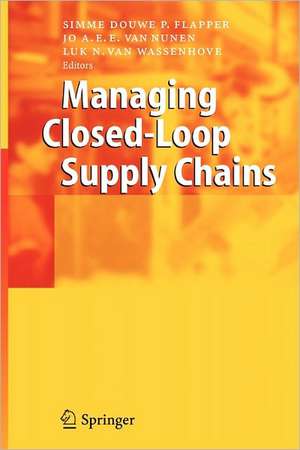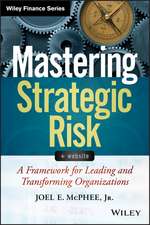Managing Closed-Loop Supply Chains
Editat de Simme D.P. Flapper, Jo van Nunen, Luk N. van Wassenhoveen Limba Engleză Paperback – 14 oct 2010
| Toate formatele și edițiile | Preț | Express |
|---|---|---|
| Paperback (1) | 384.31 lei 6-8 săpt. | |
| Springer Berlin, Heidelberg – 14 oct 2010 | 384.31 lei 6-8 săpt. | |
| Hardback (1) | 389.70 lei 6-8 săpt. | |
| Springer Berlin, Heidelberg – 21 apr 2005 | 389.70 lei 6-8 săpt. |
Preț: 384.31 lei
Nou
Puncte Express: 576
Preț estimativ în valută:
73.55€ • 76.50$ • 60.72£
73.55€ • 76.50$ • 60.72£
Carte tipărită la comandă
Livrare economică 15-29 aprilie
Preluare comenzi: 021 569.72.76
Specificații
ISBN-13: 9783642073816
ISBN-10: 3642073816
Pagini: 228
Ilustrații: XII, 213 p.
Dimensiuni: 155 x 235 x 12 mm
Greutate: 0.33 kg
Ediția:Softcover reprint of hardcover 1st ed. 2005
Editura: Springer Berlin, Heidelberg
Colecția Springer
Locul publicării:Berlin, Heidelberg, Germany
ISBN-10: 3642073816
Pagini: 228
Ilustrații: XII, 213 p.
Dimensiuni: 155 x 235 x 12 mm
Greutate: 0.33 kg
Ediția:Softcover reprint of hardcover 1st ed. 2005
Editura: Springer Berlin, Heidelberg
Colecția Springer
Locul publicării:Berlin, Heidelberg, Germany
Public țintă
ResearchCuprins
to closed-loop supply chains.- Production closed-loop supply chains.- Reverse logistics in a pharmaceutical company: the Schering case.- Reverse logistics in an electronics company: the NEC-Cl case.- Distribution closed-loop supply chains.- The chip in crate: the Heineken case.- Recovery and reuse of maritime containers: the Blue Container Line case.- Empty container reposition: the port of Rotterdam case.- Commercial returns closed-loop supply chains.- Commercial returns of sun-protection products: the L’Oréal France case.- Commercial returns of printers: the HP case.- Commercial returns in a mail order company: the Wehkamp case.- Repair and replacement closed-loop supply chains.- The repair of electronic equipment: the OMRON case.- Tire recovery: the RetreadCo case.- The closed-loop supply chain of service parts: the Whirlpool case.- End-of-use closed-loop supply chains.- End-of-lease asset recovery: the Océ case.- Cellular telephone reuse: the ReCellular Inc. case.- Recovery of car engines: the Mercedes-Benz case.- End-of-life closed-loop supply chains.- Recovering end-of-life large white goods: the Dutch initiative.- End-of-life tire recovery: the Thessaloniki initiative.- Conclusions on closed-loop supply chains.- Future developments in managing closed-loop supply chains.
Caracteristici
Insight into the possibilities and requirements for having well functioning closed-loop supply chains With cases from practice, grouped according to the starting points (inputs, triggers) for a closed-loop supply chain, like commercial returns, end-of-life returns and more Includes supplementary material: sn.pub/extras














